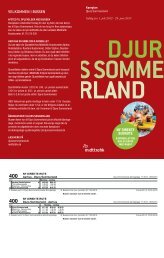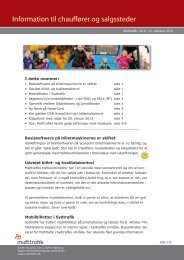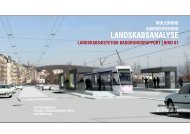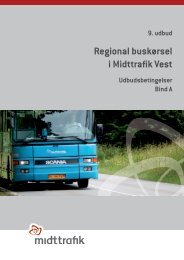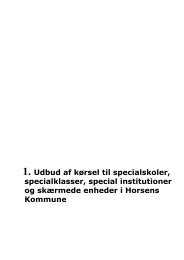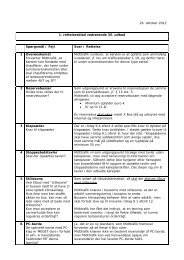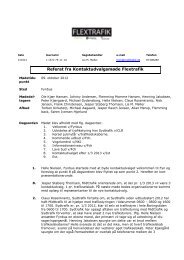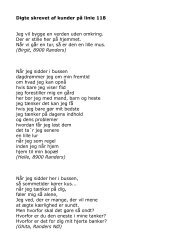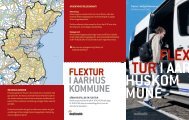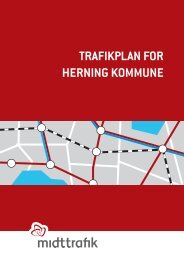Storskalaprojekt med forsyning af AFME biodiesel i ... - Trafikstyrelsen
Storskalaprojekt med forsyning af AFME biodiesel i ... - Trafikstyrelsen
Storskalaprojekt med forsyning af AFME biodiesel i ... - Trafikstyrelsen
Create successful ePaper yourself
Turn your PDF publications into a flip-book with our unique Google optimized e-Paper software.
Under the current framework conditions, use of <strong>biodiesel</strong> will mean increased costs for<br />
the oil sector. A major part of these costs is the cost of the bio-component itself, but<br />
there are also costs associated with changes to the base product. Extra costs for the<br />
base diesel have been relatively high in the test period as an alternative standard<br />
product had to be purchased, which was not necessarily optimised for that use.<br />
Apart from extra costs for the fuel itself, there will be expenses for conversion of<br />
storage tanks and even refineries. The oil industry has estimated that based on the<br />
project results, a complete conversion to handling of <strong>biodiesel</strong> including certification<br />
and approval could take up to 1½ years.<br />
Work with optimisation of the product in relation to commercial use has shown that as<br />
is also the case for non-<strong>biodiesel</strong> over the course of a year, there is a need for<br />
different solutions to satisfy the Danish oil industry’s demands and norms, as well as<br />
to minimise costs. During the test period, 2 diesel qualities were used, compared with<br />
3 under normal non-<strong>biodiesel</strong> conditions.<br />
5% <strong>biodiesel</strong> was added to the base diesel throughout the project period. Base diesel<br />
quality was primarily adjusted for density and cold weather performance. Adjustment<br />
of the cold weather performance for the summer period was not as large as under<br />
winter conditions, the reason being that <strong>biodiesel</strong> is very hard to adjust to a winter<br />
quality. During the winter period, Norwegian standard winter quality diesel was<br />
imported as the most effective solution.<br />
In general, the product which was distributed in the test period was very stable with<br />
respect to oxidation in storage facilities and fuel systems, which is supported by the<br />
fact that B5 complies with the higher demands for oxidation stability in EN590.<br />
During the project, there was intensive work to find alternative solutions to the winter<br />
situation in the form of various additives, so that a normal Danish winter diesel – or<br />
slightly modified version, could be used in the future. The cold weather characteristics<br />
CFPP can possibly be adjusted by the addition of flow improvers, though further<br />
testing and approval is necessary. Adjustment of cloud can only be done by changes<br />
in production in refineries, which would be a relatively expensive solution.<br />
In general it must be expected that use of <strong>AFME</strong> gives some extra costs to base<br />
diesel, not least in the winter period, which is reflected in a lower price for <strong>AFME</strong><br />
compared with RME during this season. <strong>AFME</strong> has however other advantages including<br />
low water, monoglyceride and metal content, as well as high stability (low lacquer<br />
formation) as a result of the low content of polyunsaturated fatty acids, doubling<br />
counting etc. Market forces will prevail, as is the case in many other EU regions,<br />
where FAME types are blended according to available base diesel and end product<br />
specifications.<br />
During optimisation of the product characteristics, there appeared a number of<br />
unexpected reactions between different components in the <strong>biodiesel</strong> and the base<br />
diesel used. This meant that the cold weather performance for a blended product is<br />
source specific, with respect to both the <strong>biodiesel</strong> and the base diesel. Experience with<br />
optimisation of base diesel with respect to <strong>biodiesel</strong> has been particularly beneficial,<br />
also over the longer term for suggestions for other bio-components than the animal-<br />
3




